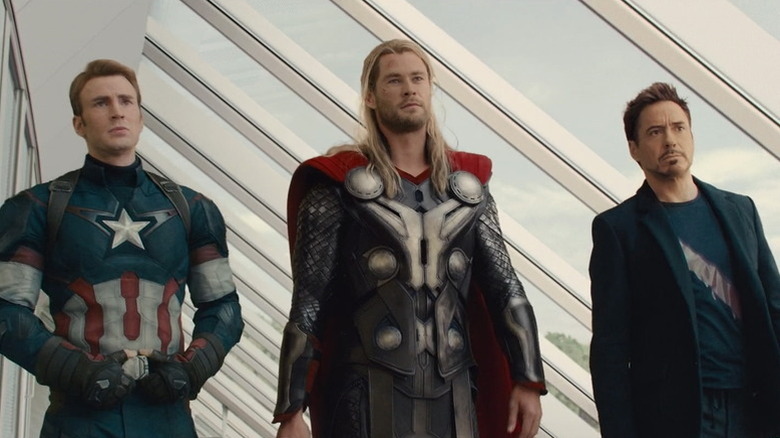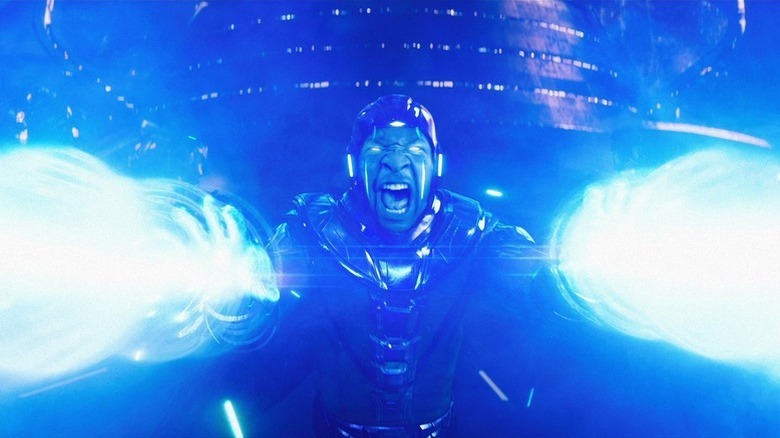Steven Spielberg Predicted Superhero Cinema Decline A Decade Ago - Is He Accurate?
If blockbusters of the 2010s were dominated by superhero cinema, the 2020s showcase that the genre has faced its biggest challenges in decades. What was once considered a license to print money has since become a representation of the law of diminishing returns. Sure, the genre still has its share of megahits like Marvel Studios' "Spider-Man: No Way Home" and "Deadpool & Wolverine," both crossing the $1 billion mark, and DC had two bona fide hits with "The Batman" and, most recently, "Superman." But the box office returns are no longer reaching the consistent highs that saw films like "Aquaman" and "Captain Marvel" both grossing over $1 billion.
In 2015, while promoting his soon-to-be Best Picture nominee, "Bridge of Spies," Steven Spielberg predicted the future of the superhero genre, specifically that it would inevitably decline in prominence, comparing its popularity and prominence in Hollywood to that of the western genre, which faced its own rise and fall. He shared his sentiments with the AP (via THR):
"We were around when the Western died and there will be a time when the superhero movie goes the way of the Western. It doesn't mean there won't be another occasion where the Western comes back and the superhero movie someday returns."
Where superhero cinema was in 2015 vs. 2025
It is worth looking back 10 years, when superhero cinema was still at its peak (well, at least, when Marvel Studios was at its peak). In 2015, Phase 2 of the Marvel Cinematic Universe concluded with the one-two punch of "Avengers: Age of Ultron" and "Ant-Man." The highly anticipated sequel to the record-breaking 2012 blockbuster was not as well-received as its predecessor, but still grossed an impressive $1.4 billion globally, yet was somewhat overshadowed at the box office by Hollywood's other latest trend, legacy sequels — specifically "Jurassic World" and, of course, "Star Wars: The Force Awakens."
Despite this, audiences were still excited to see what Phase 3 would bring, given that both "Avengers: Age of Ultron" and "Ant-Man" directly led into "Captain America: Civil War," which was released the following summer, and was universally acclaimed by critics and fans alike, setting up the foundation for what would become Marvel Studios' most beloved era. That same year, the DC Extended Universe made its play to serve as a viable competitor to the MCU. But while "Batman v Superman: Dawn of Justice" and "Suicide Squad" grossed a collective $1.6 billion globally, they were both critically reviled, setting up a rocky foundation for a shared universe that would eventually be rebooted within the next decade.
Fast forward to 2025, where superhero cinema appears to be at a turning point. The once-reigning Marvel Studios looks to be on the ropes, with all three of its tentpole releases, "Captain America: Brave New World," "Thunderbolts," and "The Fantastic Four: First Steps" underperforming at the box office. Although the latter two films are among the MCU's best efforts in recent years, the inconsistent quality since Phase 4, as well as the advent of Disney+, have negatively impacted the box office returns. Meanwhile, DC Studios' inaugural film "Superman" has performed well, especially when taking into account that the brand reputation of DC Comics was tarnished by the previous DCEU.
What Steven Spielberg's prediction got right
Steven Spielberg's prediction about superhero cinema going "the way of the Western" is only somewhat accurate. When looking at the box office numbers of superhero cinema now compared to a decade ago, it is clear that audiences are not turning up in droves the same way they used to. Much of that can be attributed to just the sheer amount of content produced, with an emphasis on quantity of material trumping the overall quality of the projects. It does not help that the rise of streaming services and inflated movie ticket prices has trained audiences to watch movies at home.
Where Steven Spielberg's prediction falls short today is the fact that we are receiving more superhero content than ever before. 2025 gave us three MCU films and one DCU film, and 2026 will likely bring in higher box office returns, especially for Marvel Studios, given that their two most popular titles are receiving sequels, with "Spider-Man: Brand New Day" and "Avengers: Doomsday" all but guaranteed to be $1 billion films. Not to mention, streaming services are chock-full of superhero shows, whether they are within the two big shared universes or not.
Ultimately, the latter half of the 2020s can serve as an opportunity for both Marvel Studios and DC Studios to bring back some goodwill to superhero cinema. Although some damage has been brought to the MCU brand, "Thunderbolts" and "The Fantastic Four: First Steps" are two critical wins that will likely bring back more excitement from fans once they hit Disney+. As for DC Studios, all of their output so far has been received well, with "Superman" being an undisputed victory for them after 17 years of MCU domination. At the end of the day, quality storytelling will win audiences back, and perhaps the filmmakers at both studios can find further inspiration from the timeless crowd-pleasing stories seen in Steven Spielberg's seminal blockbusters.


